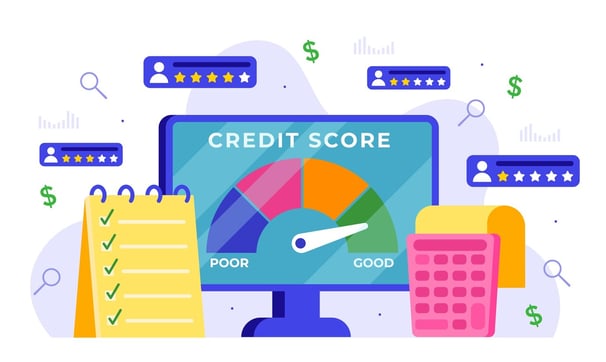How to Improve Your Credit Score in 6 Months or Less
PERSONAL FINANCE


Your credit score plays a crucial role in financial decisions like securing loans, renting an apartment, or even landing a job. The good news? You can make noticeable improvements to your credit score in as little as six months by following a series of strategic steps. Here’s a guide to get started.
1. Check Your Credit Report for Errors
Your credit report is the foundation of your score—make sure it’s accurate.
Request your free report: Get a copy from AnnualCreditReport.com.
Scan for inaccuracies: Look for incorrect accounts, outdated balances, or unauthorized activity.
Dispute errors promptly: File disputes with the credit bureaus (Experian, Equifax, TransUnion) to have mistakes corrected.
Even small corrections can lead to a noticeable boost in your score.
2. Pay Bills on Time, Every Time
Payment history accounts for 35% of your credit score, making it the most critical factor.
Set up reminders: Use calendar alerts or apps to ensure timely payments.
Automate payments: Schedule automatic payments for at least the minimum due.
Address missed payments: If you've missed a payment, bring the account current as soon as possible.
Consistent on-time payments will gradually build your score.
3. Lower Your Credit Utilization Ratio
Your credit utilization—the percentage of available credit you're using—should ideally stay below 30%.
Pay down existing balances: Focus on reducing high-interest debts first.
Increase your credit limit: Request a limit increase from your issuer (but don’t use the extra credit).
Spread out spending: Use multiple cards lightly instead of maxing out one.
A lower utilization ratio signals responsible credit management.
4. Avoid Applying for New Credit
Each credit application triggers a “hard inquiry,” which can lower your score temporarily.
Limit new applications: Only apply for credit when absolutely necessary.
Check pre-qualification offers: These don’t impact your score and can guide your decisions.
Plan ahead: If you anticipate needing a loan, build your credit score beforehand.
Avoiding excessive inquiries shows lenders you’re not financially overextended.
5. Diversify Your Credit Mix
A balanced mix of credit types can improve your score, though it’s less significant than other factors.
Maintain a mix of accounts: Credit cards, installment loans, and retail accounts.
Avoid opening unnecessary accounts: Focus on responsibly managing your existing credit.
Lenders like to see you can handle both revolving and installment credit.
6. Keep Old Accounts Open
The length of your credit history contributes to 15% of your score.
Don’t close old accounts: Even if unused, they add to your overall credit history.
Use dormant cards occasionally: A small recurring bill can keep the account active.
Long-standing accounts demonstrate credit stability.
7. Negotiate with Creditors
If you’re struggling with high balances or past-due accounts, take action:
Ask for a payment plan: Many creditors offer hardship programs or negotiated terms.
Request goodwill adjustments: Politely ask creditors to remove late payments from your report if you’ve since paid on time.
Settle accounts wisely: Resolve delinquent debts, but ensure it’s reported as “paid in full” rather than “settled.”
Proactive communication can improve your standing with creditors.
8. Monitor Your Progress
Tracking your credit score ensures you stay motivated and spot any issues early.
Use free monitoring tools: Services like Credit Karma or Experian offer regular updates.
Track improvements: Celebrate small milestones, like a jump from “poor” to “fair.”
Stay vigilant: Watch for identity theft or fraudulent activity.
Regular monitoring keeps you informed and in control.
Final Thoughts
Improving your credit score doesn’t happen overnight, but with consistent effort, significant progress can be made in six months or less. By paying bills on time, managing your balances, and avoiding unnecessary credit applications, you’ll be on the path to better financial health.
Start taking these steps today—your improved creditworthiness will open doors to better opportunities tomorrow!
